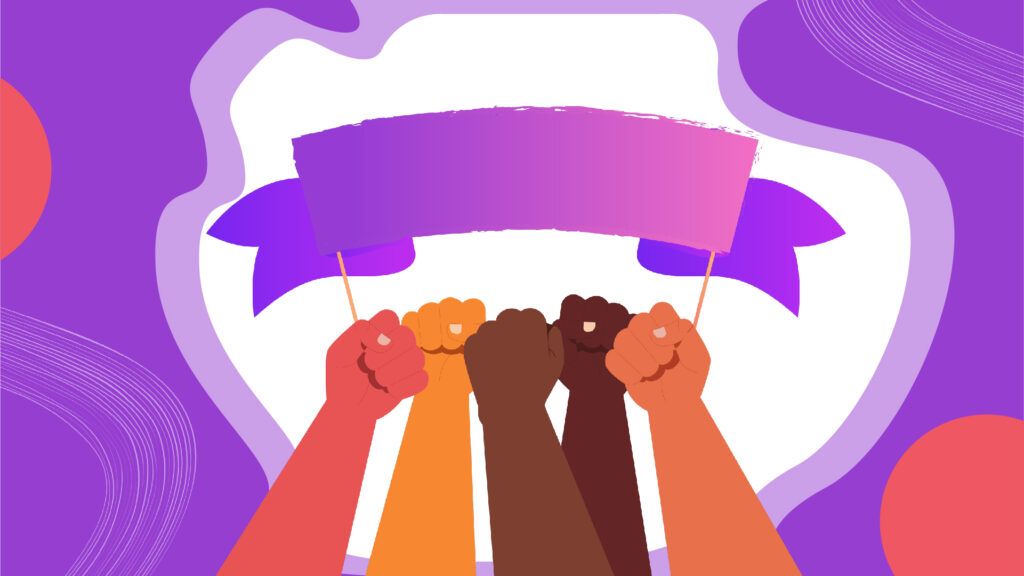AMMAN – “I was filming a new series, it was the first episode, and we were all excited. During the break, I checked my phone and found dozens of missed calls. I called one back, and they immediately asked me what’s the story behind the video?” said TV presenter and media figure Nadia Al-Zoubi, in a video statement.
Al-Zoubi was baffled to learn that someone had spread a rumor claiming an explicit video of her was being circulated on social media. Al-Zoubi’s case was not unique: according to EuroMed Rights,[1] 44 percent of women in Jordan have experienced violence from a male stranger in cyberspace.
Jordan has a very high level of internet penetration and smartphone usage. According to the Telecommunications Regulatory Commission, almost 90 percent of families have internet services at home while 65 percent of children above the age of five are using the internet. While the number of men and women using the internet in Jordan is roughly equal, women bear the brunt of digital harassment, which remains prevalent despite legislation and efforts to address it.
As the world marks International Women’s Day today, the digital sphere is another aspect of women’s and girls’ lives that is restricted and unsafe, and sometimes even life-threatening
Millions of women and girls exposed to violence online
In the MENA region, digital and cyber harassment is the most reported form of violence against women.[2] According to Jordan’s Cyber Crime Unit, digital harassment spiked during the COVID-19 pandemic; 9,500 cybercrime cases were reported in 2021, including 4,000 cases of cyberbullying, of which 2,800 targeted women. Salma Nims, Secretary General of the Jordanian National Commission for Women, has said the real numbers were likely higher, as often cases are not reported.
Al-Zoubi chose not to ignore the harassment she was facing. With the help of civil society and activists she launched a campaign, #YouWillNotBreakMe, which gained huge support on social media in Jordan.
A study[3] by UN Women found that nearly half of women in Arab states feel unsafe from online harassment, while more than 60 percent of women in Jordan have been exposed to online violence.
According to the same study, 23 percent of women in who suffered digital harassment were blamed for it, while 35 percent were told to ignore it, and 21 percent chose to go offline and delete their online presence. Alarmingly, 12 percent of women and girls in the region who survived online violence then faced physical violence by their family.
“The pandemic cemented the digital sphere as a vital dimension in our lives. Education, communication, socialising, and even receiving health care all moved online, so we must realise that digital rights are integral to human rights,” said Bisika Thapa, program lead for Gender Justice at Oxfam in Jordan.
Thapa said digital harassment undermined women’s and girls’ ability to make informed decisions about their sexual and reproductive health rights, and stripped away a crucial platform for girls to help them pursue a healthy life and make informed decisions.
“When women and girls do not feel safe to go online and access crucial information that can help in their sexual well-being or provide opportunities to make informed decisions on their reproductive choices, it is important to ask, to hear, and to know why. As the world increasingly goes online, women and girls should no longer be left on the other side of the gender and digital divide,” added Thapa.
What goes online comes around offline
Studies[4] show that online violence against women and girls is not confined to the digital space; 33 percent of women reported that their experiences of online violence have moved offline.
In August 2020, Jordanians were shocked when a 14-year-old girl was murdered by her brother for starting a Facebook account. The case was a stark reminder that female online presence is still a taboo in some communities, and that for some girls and women, going online can be life-threatening.
This digital patriarchy limits choices and potential for women and girls.
“Technology is power. Online harassment of women and girls denies them this power. It undermines their potential to learn and to raise their voices on issues that dominate and dictate their lives today and tomorrow,” concluded Thapa.
References:
[1] Online gender violence in MENA region
[2] Rapid Assessment of the effects COVID19
[3]UN Women-Violence Against Women in Online Space
[4] Ibid
